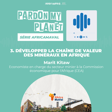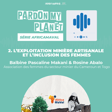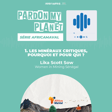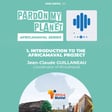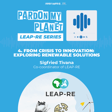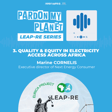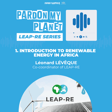Become a Creator today!Start creating today - Share your story with the world!
Start for free
00:00:00
00:00:01

Empowering women with Africa’s renewable energy
In this episode, we shift our focus to Kenya, where Anne Wacera Wambugu, an electrical engineer and researcher at Strathmore University in Nairobi, discusses the current state of renewable energy development and its future prospects. Anne sheds light on the pressing issue of electricity quality and equipment disparities, particularly in solar energy production, and highlights the need to empower women in this field.
More information on: lgi.earth/podcast
Transcript
Introduction
00:00:10
Speaker
Hello and welcome to Pardon My Planet podcast. I'm Anshalot, your host.
Series Context
00:00:14
Speaker
This episode is part of a series on the development of renewable energies in the African Union countries. The first episode dedicated to the importance and context of renewable energy development is already out. You can find it on major platforms and on lgi dot.earth website, Other episodes are coming, so stay tuned for more valuable insights and exciting stories.
LIPRI Project Overview
00:00:38
Speaker
Anna Wasera Wambugu is our guest today. She's an expert at electrical engineering in Kenya at Strathmore University in Nairobi. They lead several initiatives in the LIPRI project. LIPRI is a co-piloted project between Africa and Europe to develop access to renewable energy technologies.
00:00:57
Speaker
Hello Anne. Hi, how are you? ah Good and you. it's a Thank you. It's ah it's a pleasure to to have you on the on the show. i'm a It's a pleasure to be here
Electrification Challenges in Kenya
00:01:05
Speaker
too. ah You are working on electrification challenges. and Could you please tell us, ah where are we now and where are we heading in terms of renewable energy development ah in Kenya and in Africa? um Okay, so my name is Anna Sheva, like I said, I'm an electrical engineer and my work involves studying electricity systems in different capacities. So um with respect to where the world is in terms of electrification and where we're going, um I'd say the biggest issue normally is defining what electrification is, right? Is it having a connection?
00:01:45
Speaker
Is it having the ability to power certain appliances? And I'd say there's still quite a number of unconnected um people who are not connected, even just their minimum connection. So we're fixing that, and they need a connection. But then there's questions about, for the ones who are connected, um what do we need to do? So there is lack of reliability of electricity for the ones on the grid. There's the ones who have um energy needs that are not being met by the systems that they have um installed. So let's say you you install this on a system and it's only giving you lighting and now you want to upgrade. So I'd say it's a spectrum. So um we're doing well um and we can do better in terms of connecting new, making newer connections. What we're not doing very well is in going back to the ones who have already, were already connected and figuring out what the problems and the issues that they have are.
Renewable Resource Integration
00:02:43
Speaker
okay and so In this um development of electrification, ah you work especially on the renewable energy part. How does it work and how how where are we in terms of of development? So the question of renewable energy is a complicated complicated one, right? um Because in a lot of countries, the biggest problem that there is um is that ah renewable energy resources, not every country is very rich. So some countries have richer renewable energy sources than others. And um I happen to work in a country with that's very rich. We have a lot of solar radiation. Even today, it's raining outside. But they' um if you put a panel outside, you'd be able to probably charge your batteries.
00:03:27
Speaker
um We have Jufthamu. and we have hydropower. So Kenya is very rich in renewable energy resources. So to speak in the context of Kenya, our grid is very green, and that comes with its own challenges. So we need some thermal systems, for example, to enable us to power, there we need to increase the renewable energy um systems in the grid, um or even to have the ones that we have right now. So
00:03:58
Speaker
um That challenge is universal.
Decentralized Energy Solutions
00:04:02
Speaker
We need renewable energy systems. We need to decarbonize our electricity systems. That's very, and very, very true. What we also are very cognizant of is that these challenges with our grids are not built for these systems. In the form of decentralized energy systems, I say that's That's where the revolution is happening. So on the grid, it's a bit more complicated because the grids are not built for renewable energy systems. We need to figure out how we build our grids better or how we'll integrate renewable energy systems into the current grid.
00:04:38
Speaker
But on the decentralized front, you can install your own um PV system right now in whatever. That means that people who um think of you live on a mountain somewhere in a very rocky place. If you live in such an environment, um it's very hard to get the government to bring ah to drop a wire down to where you live. And such people, especially on our continent, because we have a lot of solar radiation, have a chance to actually be electrified. um I say that as someone who acts up with Rwanda quite a bit. So Rwanda is the land of a thousand hills. That's literal. Yes, that's literal. So in Rwanda, there's serious challenges with respect to um pulling the grid all over the place. And there's a huge
00:05:30
Speaker
um chance to actually electrify a good chunk of the population using um solar if we can actually get
Quality and Trust in Solar Products
00:05:36
Speaker
solar right. Okay and also when we prepared this episode you mentioned something about electric quality ah not being equivalent everywhere and as well as the quality of equipment of course not being also equivalent especially in solar energy production. um What are those challenges that people in Kenya and Africa are facing regarding those two problematics? oh I can talk about it still tomorrow. so quality is i actually When I said i I'm an electrical engineer who researches electricity systems, I research specifically quality of electricity systems. And that's
00:06:19
Speaker
a very niche thing that i you know I'm going to learn about this for a few seconds. so um Think about the equivalence I like making is the drop shipping um ecosystem. You are aware of it because when in in France, you can actually order from a Chinese vendor and they'll drop on an appliance down to you to your household. right and Most of the time, the quality checks that your government would normally do will not have been done um somewhere along the line. Because this person, it came from a warehouse in China and somehow found its way into your doorstep. And sometimes, of course, the quality checks will have been done on this Chinese end. But if you find a bad vendor, they'll actually ship you bad quality stuff.
00:07:10
Speaker
So in that, in that instance, you as the customer have to be able to discern quality without having the technical background or the awareness of what the product is doing. Now take that and make it a whole country. So if you live on the continent, ah good chunk of your ah because of the quality ecosystem, um it's it's not as strong as the one you'd find in, let me say, northern countries. So there'll be struggles to actually control influx of poor quality products, which means the job, the
00:07:45
Speaker
the job of identifying quality is left to the end user. Who is my grandmother? She has no knowledge of ah how to buy a good quality electric cooker or a good quality um you know washing machine or whatever it is that she needs to buy. and On that front, that's that's a very big problem. So part of my work has been trying to figure out how do we empower consumers, but also improve the robustness of the quality because of the quality framework that's existing in on the government front. um On systems now, because I was just talking about
Consumer Empowerment and Education
00:08:23
Speaker
appliances. That's just me saying, if you buy an appliance, you do not know what you're getting from the supermarket sometimes.
00:08:29
Speaker
When it comes to systems, um there's an interesting thing. So if you aren't an electrician right now, I'm pretty sure there's electricians near you. So you'll call someone and ask them, hey, who do you use it as your electrician? In northern countries, that system has existed for so long that you're likely to actually hire a qualified electrician. On our end, Let me first of all point out that rural education happened recently. My parents got connected to electricity in 2015, which means electricity electricity in some areas on the continent is very new. What does that mean? It means that the electrician who is doing its solutions in rural communities right now might just be someone who, after electricity came, started learning how to put things together.
00:09:23
Speaker
They don't have proper qualification. What does that end up looking like? All kinds of things, fires, poor quality systems. you spend um Think of someone who's um spent $200 on a system. This person earns probably $50 a month, so they've spent around four months of their on on their pay on a system, and then it fails within five days. so um Quality is something that most people don't think about a lot, but it impacts money. So we waste a lot of money on um bad quality installations and bad quality um that appliances,
00:10:04
Speaker
especially for people who, people like us, let me say on the continent, who don't have a lot of disposable income. So I don't have a lot of money to buy. It's a very big problem. It's not like buying, you know, my friend in the US buying a a bad pair of Nike's
Innovative Solar Solutions
00:10:20
Speaker
and then going like, ah and let me say counterfeit Nike's and saying, you know what, um it's OK, I'll count that as a loss. That's not the same thing. The disposable income that you find in the global North versus what we have here is very, yes so buying for quality is that much more impactful.
00:10:39
Speaker
And also, I guess that once you've spent so much money on something that is so vital in your everyday life, yeah you have this kind of mistrust also saying, okay, I tried this, but it didn't work at all. So so I will but go back to maybe another type of electricity that is not green at all, because at least I i know it's reliable. Right. That happens a lot with generators. So we did a study recently where we collected data on, we're just collecting data actually on solar quality because you're building an application for solar sizing. And um one of the things we found is that a lot of farmers, whenever we went there, we were like, they're like, I bought that thing. It did not work. Solar is bad. They don't say the technician I hired is the one who has a problem. No, no, no, no, no, no. They say solar is bad.
00:11:27
Speaker
And why is that a problem? Like I said at the beginning Kenya needs solar to electrify. It's one of our most important um you know sources of electrification. We can't afford solar getting a bad job, right? And it's important that we actually work to fix that. It's something of concern to me because I'd like people in rural communities to be able to trust solar photovoltaic systems. And so the app that you're developing, in what sense is it helping also for this quality?
00:11:58
Speaker
So we realized that um most of the apps that exist in the market, so like these's companies like Homa that have apps in the solar market, are very complicated. so um And then they they do require you to have some sort of technical background. So um to give you an example, the microphone you're using right now is a certain number of watts. um that's ah That's an amount of electricity that um it can't consume at any given moment. It's a very simple concept, right? I've just explained to you the way to count how electricity is built is take your microphone and figure out how many hours in a day you want to power it for and then use that to to develop what size of solar system or what size of battery you want to put into the system.
00:12:49
Speaker
um But the mathematics that goes into it, if I was to give you now the numbers, the place to input the figures, it looks very complicated. It's supposed to be a simple Excel worksheet, but it's not. um So um what we thought is, because it's very simple, like it's just a bunch of math, we can take this those numbers, put them into an application. It's such a simple concept that I think um the day we thought about it we were like wait there must be someone who has done it and then we went looking and there wasn't anyone who had done it and um so we coupled it with something else so we decided to um
00:13:31
Speaker
One of my business partner on that front, he has a patent on a QR code label that you can put electrical parameters in. In short, um we just load a bunch of electrical parameters. So imagine this. Instead of you even entering the numbers that I've told you, um there is a QR code that exists behind your laptop. You scan it. It loads the information. um You scan another thing you want to power. And then after you're done scanning, it tells you, you need this size of a solar panel. you need this size of a battery and you need this size. It tells you the components rather than you ever having to think. That's where we want to be.
00:14:08
Speaker
We're starting off, of course, with the entering manually, um but we're hoping that one of these findings we're going to be able to convince manufacturers to append the QR codes onto appliances so that people are just able to like time um kind the scan the the product. so That one is is an IP that um the team owns. okay and now Just what is the name of this app? If anyone listening would like to to use it. to Sansif, that's what we've named it right now. um So if you go to YouTube and search Sansif and Strathmore, you should be able to get a um a YouTube link um that explains what we're trying to do. It's very simple. So even if you don't have a technical background, it can explain to you very well what we're trying to do. Then we'll put also I think the link in the in the podcast page so people can can go in there and watch it. Thank you.
Gender and Technology Adoption
00:15:02
Speaker
And the also another challenge that we talk about when we think about everyday appliances and the needs um that we have in every day. um There is something in that in in an there is an aspect in which you are very active. It's the gender dimension.
00:15:23
Speaker
of electrification. And to give maybe a concrete example, ah you led an initiative on ah clean cooking. I think it was in Lipry, if I'm not wrong. And could you please tell us about this and how this gender aspect is so important and not to be forgotten when you develop ah this ah this kind of technologies? Yes. So I'm going to use an example of a stand-up event. So we we did this study where we were giving out um electric pressure cookers. And of course, they were making a small payment, but the only the small payment was so that um it it doesn't seem like a charity thing, because you wanted them to use it. And sometimes when someone gives you something for free, you might think, ah um I can put it in the back pocket. So they very small, let's say 1% of the cost is what they were paying. Sometimes they'd go into a household and find um that the wife
00:16:18
Speaker
um the person who'd be using the prashakukha, the husband has said, I don't want to see that thing in my house. And you'd think if you're newly electrified, any appliance that someone gives you as a gift is something that's amazing, right? And the husbands were like, no, um you'll get lazy, right? um There was another one who was like, they're trying to take my wife by giving her gifts. um There were all kinds of strange things, and this doesn't just happen for the electric cooking pilot. I'm training 150 women in Rwanda right now, on Soul after Boutique systems. I've also done the training in Kenya, so I've trained around 100 to even I think 300 by now in Kenya.
00:17:05
Speaker
One of the things we do every now and then is we do that training for non-engineers. These are women who are doing solar sales. Think about someone doing solar sales as a job. so This is someone in a rural community who was probably introduced to the job by a friend. like A friend even said, um I have this this job, come and do sales for solar. You get some nice money back. We target them every now and then to come and do training with us. Remember, we paid everything and the only thing the woman needs to do is show up. And the biggest challenge we've seen is that sometimes the husbands will say, you're not going anywhere.
00:17:48
Speaker
um There was a case, an interesting case of one of the women who is the one who works, but they hold this joint account, which is controlled by the man. She needed around $20 to get to Nairobi and back. her money. He doesn't say, no, you're not going to waste my money. And we had to pay, we gave her extra money. And even then he started finding all
Household Appliance Priorities
00:18:18
Speaker
kinds of weights. She had an 11 year old um son and he was like, who's going to take care of this kid when you're gone? Another story was another one who um comes to me and says, um so she calls us and says,
00:18:32
Speaker
um My husband has actually threatened to beat me. And in those moments, you're very conflicted, right? In those moments, you're wondering, what should I prioritize? This woman's safety or her coming to the the training? So in that case, we had one of our colleagues pick up the phone and do a negotiation. It was like a hostage situation. Let me tell you, when I started this work, This is what I did not anticipate would happen. like this If you told me this part, um training is easy. So when someone gives you money to train, you're like, cool, we're going to do this. And then you have to deal with all the dynamics of empowering women in the in the in the on the continent or in patriarchal societies, because there's a assumption there's an assumption that it's easy. It's not. um Yeah, the last one I'd like to mention is um I mentioned the thing about the appliances.
00:19:27
Speaker
that are prioritized. So a lot of times when households buy appliances, they'll buy a TV. If you've ever lived with a man, you know that's the first thing that goes up. So you find you'll go to a house, you'll find that they'll have every single appliance that the man wants. right He needs a TV to watch football. He needs a radio to do this. But in the kitchen, everything is still happening the same way. um And one of the most important things, as someone who grew up using firewood, is the cooking process itself. so um just being able to prepare food without needing firewood. But yeah, try and convince someone who, like, why does my wife need that automated? Why why do they need a pressure cooker to boil? They can just get firewood and boil the beans, right? And I noticed that it's not just a trend for cooking.
Sustainable Cooking Solutions
00:20:20
Speaker
So that's how we ended up with a cooking project, because with
00:20:23
Speaker
Our interest was to develop a DC cooker. There's already electric pressure cookers for the AC grid, um but then we were we thought there's no there were no DC cookers at the time. What does what does it mean, sorry, a DC cooker? Yes, so AC is what you have on your wall in the house, right? like The grids that comes to your house. um DC is what is produced by solar. But ah at the time when um we started in 2020, there was kind of not that much development of DC cookers. So we decided to develop one that would work with solar. um And that's what we've been doing for the last four years. And I think we've just built the first prototype.
00:21:14
Speaker
ah So we should be able to actually test it out and see if it's what we expected it to be, yeah. Okay, well, that's a great great job. And also maybe one last question about what it's like also to be a ah ah woman with electrical engineer.
Challenges for Women in Engineering
00:21:33
Speaker
How is it it's challenging everywhere, I guess, to be a woman? How is it challenging to be an electrical engineer and expert in Kenya and in Africa? Yes. Let me tell you someone asked me this question.
00:21:49
Speaker
I love because there's so many stories to tell. So I work in standards. So let's start there. Standards and quality is heavily male-dominated. So I'll have meetings where I'll not just be the only woman, but I'll also be the only African. um In the past it's happened and I was pretty shocked. First of all, you kind of start getting accustomed to being only this, only that. And for some people, it's a nice thing, I guess, to be the first or to be the only. For me, it's a concern with respect to representation, because if I'm the only one who's given the perspectives of Africans, the perspective of women, um we have a problem because I don't have the universal perspective of all African women.
00:22:37
Speaker
So if you depend on me, you're probably getting a very biased view based on my upbringing and my experiences. I can only help as much as I know. So that is from my vantage point. So um i at some point, you know I used to attend a lot of gender things. We went to our workshop. We talk about, oh, we don't have enough electrical engineers. A, we don't have enough um technical capacity for women and all these different things. And that's how I actually started offering the solar training for women. um I came in through one such solar training. So I was like, let me continue the job. right And I think at some point, it was the realization that that was not enough.
00:23:28
Speaker
For you to get people like me into the space, people who are doing the kind of work that I was doing, we needed to be giving women jobs in the space. So yeah, that's when I started noticing, because I'd ask every now and then I'd meet someone in the sector. And there was a common thread with women, which is they don't get a assigned engineering work in their organizations. they get assigned secretariat work. Not saying that's not important. It's just that if you if you're saying there's not enough women in the sector and then you're refusing to give women technical tasks, one of them was ridiculous. One of so one of the women who reached out to me was like, she was told it's because of her nails. You think about it and like, what does that have to do with anything? Yeah?
00:24:22
Speaker
um Because she's a galley. She's a galley girl. I'm i'm very tomboyish, so sometimes I fit in. I fit right in. My short hair, um I dress in a certain way, and I've always been like that. But then I have people in my team who are very galley. And in that aspect now, I'm going to mention what I decided to do about it. So I went to my boss. It's called Professor Izael da Silva. He is a Brazilian Ugandan. um And now Kenya, because it's been in Kenya for around 12 years.
Empowering Female Engineers
00:24:53
Speaker
So I was like, Prof, do you think um we can actually start absorbing women? You know, because if we were everyone is complaining, there's no women, but no one is giving not no one. Let's say I had not seen that many people giving them extensive opportunities. So
00:25:13
Speaker
At some point two years ago, USA reached out to him and they're like, we are aware that you've been doing some work on women. So we'd like to give you five internship positions for female engineers. And yes, we absorbed them. So it was supposed to be for six months. So they paid them for six months. And then after the six months, we absorbed them. um And we've continued that since then. So right now I have a team of 11 and one is a guy. He'll be happy to know he's very happy for the ones who are wondering. um so So one is a guy, um but the other 10 are women, so scientists and engineers, and also um our general mode of operation in in in the team that I lead is
00:25:58
Speaker
adam We've come here, pick a thing you want to do and run with it because it's a research environment. Tell me what interesting stuff you see in here that you'd like to actually look at because I selected quality and standards for myself and it ended up very well because you see I selected it. Someone else will come and select something else. I have a colleague who's super obsessed with life cycle analysis right now. There's another one who's just saying, Joseph, there's someone else who's decided they're going to be doing a motor energy food modeling. It's a free environment where you come and we assign, we will put you in a project, right? Work on the project, but in the meantime, your job is to figure out what research path you want to take. I'm just saying, we need to stop talking.
Creating Inclusive Work Cultures
00:26:46
Speaker
um In the organization that you're in, the next time they want to sponsor ah women in engineering or women in energy events, you need to ask them what they're doing internally to retain women, what kind of work environments they're creating to retain women. Because one thing I've noticed over time supervising a group of women for the last, let's say, three years or four years, is that women work better in communal environments. um Excessive kind of competition is going to actually, um so if you put them in an environment that tries to force them to um do the hyper-competitive environments, they somehow survive. I can probably muscle my way through ah those those environments, but even me,
00:27:32
Speaker
with my ability to adapt in hyper competitive environments, I still prefer ah more communal environments. So what kind of culture do you have? um Is it a culture conducive for um keeping women around? And yeah, let's talk. Let's talk more action. Yes. That's a perfect way to i think end our episode and very inspiring. ah Thank you so much, Ann, for being our guest today on the Pardon My Planet podcast. And you can find also more information on this topic and all the links and all the the references we've been talking about in this episode. You can find it on lgi.us. Thank you, Ann. Yeah, see you. And thank you so much for having me. It was a pleasure. Thank you. And until next time. Bye bye.
